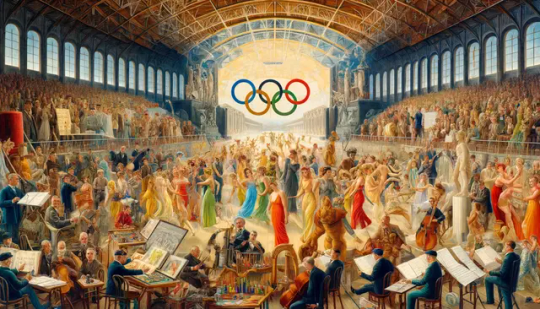#Pierre Deporte
Explore tagged Tumblr posts
Text
Tamra, the island

View On WordPress
0 notes
Text
Poilievre Pledges Tough Stance on Hate Crimes: Defending Canada’s Values and Security
In a powerful display of leadership and determination, Conservative Party of Canada leader Pierre Poilievre has promised to take decisive action against those who threaten Canada’s social fabric. During a high-energy campaign event on Saturday, Poilievre vowed that if elected on April 28, his government will deport any foreign visitors who engage in antisemitic crimes. This firm promise…
#Antisemitism#Canadian Leadership#Canadian Values#Conservative Party of Canada#Deportation Policy#Hate Crimes#National Security#Pierre Poilievre#Tough on Hate
1 note
·
View note
Text
Simple Plan @ Pabellón Oeste, CDMX




Octubre, 2023 Shot on iPhone
#simple plan#concert photography#photography#gig#foto#fotógrafo#fotografo#conciertos#concierto#pierre bouvier#palacio de los deportes#music#live#live music#shot on iphone#camera#portfolio#portafolio#event#events
1 note
·
View note
Text

Pierre van Hooijdonk • Celtic FC (1995-1996)
#Van Hooijdonk#Celtic#Deporte#Fútbol#Pierre van Hooijdonk#Celtic FC#Futbolista#Delantero#Celtic de Glasgow#Scottish Premier League#Scottish Premiership#Primera División#Escocia#Celtic Football Club#Deportes#Football#Sport#Footballer#Forward#Scotland#Top Tier#Sports#Retro Fútbol#1990s#90s
1 note
·
View note
Text
"Los Aros Olímpicos: La Historia Oculta del Símbolo Más Icónico del Deporte"
#Aros Olímpicos#Deporte y Unión#Espíritu Olímpico#Historia Olímpica#Juegos Olímpicos#Pierre de Coubertin#símbolo de esperanza#unidad global#Visión Global
0 notes
Text

In response to the highest court in United Kingdom claiming the right to define others' gender for them, we recall the words of a famous French anarchist:
"To be gendered is to be kept in sight, inspected, spied upon, directed, law-driven, numbered, & enrolled, indoctrinated, preached at, controlled, estimated, valued, censured, commanded, by creatures who have neither the right, nor the wisdom, nor the virtue to do so...
"To be gendered is to be at every operation, at every transaction, noted, registered, enrolled, taxed, stamped, measured, numbered, assessed, licensed, authorized, admonished, forbidden, reformed, corrected, punished. It is, under the pretext of public utility, and in the name of the general interest, to be ransomed, exploited, monopolized, extorted, squeezed, mystified, robbed; then, at the slightest resistance, the first word of complaint, to be repressed, fined, despised, harassed, tracked, abused, clubbed, disarmed, choked, imprisoned, judged, condemned, shot, deported, sacrificed, sold, betrayed; and, to crown all, mocked, ridiculed, outraged, dishonored.
"That is gender; that is its justice; that is its morality."
—Pierre-Joseph Proudhon in drag
Against all states, judges, laws and rights—for freedom and anarchy!
568 notes
·
View notes
Text
“To be governed is to be watched over, inspected, spied on, directed, legislated at, regulated, docketed, indoctrinated, preached at, controlled, assessed, weighed, censored, ordered about, by men who have neither the right, nor the knowledge, nor the virtue… To be governed is to be at every operation, at every transaction, noted, registered, enrolled, taxed, stamped, measured, numbered, assessed, licensed, authorized, admonished, forbidden, reformed, corrected, punished. It is, under the pretext of public utility, and in the name of the general interest, to be placed under contribution, trained, ransomed, exploited, monopolized, extorted, squeezed, mystified, robbed; then, at the slightest resistance, the first word of complaint, to be repressed, fined, despised, harassed, tracked, abused, clubbed, disarmed, choked, imprisoned, judged, condemned, shot, deported, sacrificed, sold, betrayed; and, to crown all, mocked, ridiculed, outraged, dishonoured. That is government; that is its justice; that is its morality.” - Pierre-Joseph Proudhon
113 notes
·
View notes
Text
Boycott!

Now that I have your attention:
#free palestine#cartoon#cartoonist#israel is a terrorist state#palestine#israel#free gaza#gaza#palestina#hatsune miku#jumblr#jewblr#free sudan#free haiti#billford#the book of bill#gravity falls#deadpool and wolverine#deadpool#artists on tumblr#artist on tumblr#save the children#save family#lana del rey#stranger things#sonic 3#sonic movie 3#harris#kamala harris#reblog this
122 notes
·
View notes
Text
mi vida sería más fácil si me gustaran gays ficticios y no pseudo-homosexuales de la vida real
Chan llamando good boy a seungmin va traer un montón de petplay a la mesa... PERO NO DE MI SHIP
#Esto es sobre idols#Pero también sobre deportistas#Yo era más feliz antes de ver a Pierre haciendole ojitos de corazón a yuki#O a rodrigo bentancur lesionarse en el mundial o a sonny siendo amado por corea o a cuti abrazado a leo#O ese video de marco bezzecchi diciendo incredibol que me metió a este deporte de la muerteeee
1 note
·
View note
Text
The Princess Royal and Sir Tim Laurence’s visit to Guernsey for the 80th anniversary of the liberation of the Bailiwick
Friday 9th May
The Princess Royal, accompanied by Vice Admiral Sir Tim Laurence, visited the Island of Guernsey, on behalf of His Majesty The King, to commemorate the 80th Anniversary of the Liberation of Bailiwick.

Her Royal Highness attended a Parade to commemorate 80 years since the Liberation of Guernsey at St. Peter’s Port seafront. During the Parade, The Princess Royal received the Royal Salute before being invited to inspect the front rank of the Parade escorted by Lieutenant-Governor of the Bailiwick of Guernsey.

After inspecting The Royal Marines Band, Her Royal Highness shared a message from The King to the people of the Bailiwick of Guernsey;
To my most loyal people in the Island of Guernsey, I send my warmest greetings on this the Eightieth Anniversary of your Liberation from enemy occupation.
I was interested to learn that this occasion will be commemorated and celebrated by people of all ages, with a focus on the ever-decreasing number who lived through the War, whether they were evacuees to the United Kingdom, stayed in occupied Guernsey or were forcibly deported to Europe. I also note today the attendance of leaders and people from Biberach, with whom Guernsey has so successfully reconciled itself since the War. I am delighted that The Princess Royal has the opportunity to represent me on this special day in the Island’s calendar.
The Queen and I have particularly fond memories of our all-too-brief visit to Guernsey last year and the wonderfully generous welcome we received. As always, I am most grateful for your continued allegiance and loyalty and I am pleased to reaffirm the close ties that have existed for so long between the Crown and the people of the Bailiwick.
My thoughts and prayers remain with you for your future happiness and the prosperity of your beloved Island.
CHARLES R

Her Royal Highness also had an opportunity to meet representatives of Guernsey’s Wartime Generation and representatives from Biberach-an-der-Riss, a town in southern Germany where the majority of the 1,003 Guernsey residents who were deported by the occupying forces in 1942 and 1943 were sent to. In recent times, links between Biberach-an-der-Riss and Guernsey have formed, focussing on peace and reconciliation.

After the Parade concluded, The Princess Royal attended a church service to commemorate the Liberation Anniversary. The parish church of St. Peter Port, also known as Town Church, held the annual Liberation Day service which was attended by representatives from the parade, including Veterans and representatives of the Occupation Generation, visiting German and French officials, emergency service representatives and members of the public.

Her Royal Highness then visited the St. Peter Port Parish 80th Anniversary celebrations. Here, Her Royal Highness listened to the Festival Choir sing in Guernésiais, before meeting representatives of Guernsey’s wartime generation, which included Mr. Roland Duquemin who stayed in Guernsey as a young boy during the occupation and remembers King George’s visit to Guernsey after Liberation; Mrs. Margaret Duquemin who was evacuated to Bradford with her mother and two sisters and Mr. Ralph Godwin who was deported to Biberach with his parents and twin brother.

Before departing, Her Royal Highness unveiled a plaque to open the new Visitors’ Centre in St. Peter Port Parish.

From St Peter Port, The Princess Royal travelled to L'Erée on the west coast of Guernsey to attend celebrations at St. Pierre du Bois Parish. After listening to a Poetry reading and viewing a dance performance, Her Royal Highness met more representatives of Guernsey’s wartime generation.

This includes siblings Mr. John Bourgaize, Mrs. Winnie Keyho and Mrs. Joyce Scratton (three of eighteen siblings) - all three siblings remained on the island during occupation.
After attending celebrations in St. Pierre du Bois Parish, Her Royal Highness visited Festung Guernsey at a former German gun battery. Festung Guernsey preserves the fortifications built by the Germans and The Princess Royal toured the underground complex at Batterie Mirus, the largest naval battery in the Channel Islands.
14 notes
·
View notes
Text
by Dion J. Pierre
US President Donald Trump on Wednesday issued a highly anticipated executive order aimed at combating campus antisemitism and holding pro-terror extremists accountable for the harassment of Jewish students, fulfilling a promise he made while campaigning for a second term in office.
Continuing work started started during his first administration — when Trump issued Executive Order 13899 to ensure that civil rights law apply equally Jews — the “Additional Measures to Combat Antisemitism” calls for “using all appropriate legal tools to prosecute, remove, or otherwise … hold to account perpetrators of unlawful antisemitic harassment and violence.” The order also requires each government agency to write a report explaining how it can be of help in carrying out its enforcement.
Additionally, it initiates a full review of the explosion of campus antisemitism on US colleges across the country after the Palestinian terrorist group Hamas’s massacre across southern Israel on Oct. 7, 2023, a convulsive moment in American history to which the previous administration struggled to respond during the final year and a half of its tenure.
“The report submitted by the Attorney General under his section shall additionally include an inventory and analysis of all court cases, as of the date of the report, against or involving institutions of higher education alleging civil-rights violations related to arising from post-Oct. 7, 2023, campus antisemitism and indicate whether the Attorney General intends to or has taken any such action with respect to such matters, including filing statements of interests or intervention,” the order says. “The report submitted by the Secretary of Education under this section shall additionally include an inventory and an analysis of all Title VI complaints and administrative actions, including K-12 education, related to antisemitism — pending or resolved after Oct. 7, 2023 — within the Department’s Office for Civil Rights.”
Another major provision of the order calls for the deportation of extremist “alien��� student activists, whose support for terrorist organizations, intellectual and material, such as Hamas contributed to fostering antisemitism, violence, and property destruction on college campuses.
#donald trump#antisemitism#additional measures to combat antisemitism#executive order 13899#campus antisemitism#pro-terror extremists
29 notes
·
View notes
Text

Robespierre mené au supplice by Pierre-Antoine Demachy , 1794.
For those saddened by the deaths of the Robespierre brothers, Philippe Le Bas, Couthon, Saint-Just, Hanriot ( I have to confess i'm so sad for Hanriot one of my top 10 of the frev), etc., remember that at least they died before witnessing the social aspects of the revolution being betrayed (or at least completely betrayed), unlike Goujon, Charles-Gilbert Romme, Gracchus Babeuf, etc. Or worse yet, seeing Napoleon put an end to the revolution (I think without a doubt that Augustin would have taken it very badly) with all the consequences that entails and a greater regression. You know, there is a quote that says happy are the revolutionaries who died before seeing all their ideals betrayed (remember the despair of Pierre- Germain Gateau, a friend of Saint-Just, who died in 1815 after seeing Louis XVIII return, surely the despair of the Jacobins under Napoleon who died in deportation signed by his order without any trial). When the executed of the 10th Thermidor died, they knew that France had been saved from foreign power and that it was necessary to remain vigilant to ensure that there was no military dictator or the return of the Bourbons. Revolutionaries like Prieur de la Marne saw both happen at the same time (imagine for him months, even years, of hard work with so many others, the efforts of a people ending up in such a situation). I’m not even talking about devoted revolutionaries like Louis Delgrès who learned that despite their devotion to the revolution and to France, they had no choice but to fight to regain their freedom ,dignity or die because of the reinstatement of slavery, or other black people who saw their rights taken away.
Another point that may comfort (or sadden) you is that despite their being outlawed, look at how many people came to their aid despite all the risks of helping them and ending up on the guillotine (which will happen, the number of guillotined will be frightening the day after the 10th Thermidor). This proves that loyalty cannot be bought and must be earned (I have already said this in one of my posts). Despite all their faults, it is clear that those condemned to death know how to inspire true loyalty. Moreover, they had scruples to the end concerning the legality of their actions. Compare this attitude to the deplorable attitude of the 18th Brumaire. After his lamentable behavior in Egypt to the point that Kleber had to clean up the fiasco of Bonaparte himself, Napoleon decided to take power for himself and conspired against the deputies of the Five Hundred with the complicity of some rather dubious characters. After being caught red-handed and deservedly outlawed (if you want my opinion), he immediately unleashed the army on the deputies who were expelled, and some were even arrested. Ultimately, when Bonaparte was really in trouble, not many people came to his aid. The difference in attitude between the Robespierre brothers, Philippe Le Bas, Couthon, Saint-Just (despite all their faults and things they have to reproach themselves for) and Bonaparte regarding the reason for being outlawed and how they reacted to it speaks volumes to me (even if some will say it is unfair that the first group mentioned went to the scaffold while Napoleon and Talleyrand, in particular, came to power).
These were just the reflections of an ordinary citizeness :)
#frev#french revolution#robespierre#thermidor#hanriot#saint-just#augustin robespierre#couthon#Le Bas#napoleon
52 notes
·
View notes
Text
I am getting really fucking tired of the discourse around current Canadian nationalism. Because I don't think you understand that EVERYTHING has changed.
This is going to be a rant.
Before Trump began threatening Canada, this last election was going to be a Conservative supermajority. Pierre Poilievre was going to take Canada and make us Daddy Donny's bestest little buddy because the Liberals were the party in power during COVID and the party in power during COVID has lost just about every election in every country in the world that's had one.
Then Trump said 51st state. And Poilievre lost the election he had been planning for since he became party leader. Pierre Poilievre was going to be the first step in bringing Trump-style fascism to Canada. And we just rejected him. It was close, worryingly close, but Canada said no.
Much of the modern Canadian far-right is funded by the United States. Hell half the grassroots donations raised by the Trucker Convoy came from Americans. The US had a hand in the 2025 election, making massive donations to Poilievre's Conservatives.
Now that the right-wing Canadian nationalists have to reject the US to not COMPLETELY destroy their minds with cognitive dissonance, they have to lose much of their power and influence.
Canada's current surge in nationalism is a REJECTION of Donald Trump and of American influence. Now that the people we were parroting all those christofascist talking points from are banging at our doors, their ideas are going to become (and already are) much harder to swallow.
We're not Weimar Germany, we're Ukraine circa 2021. Our nationalism right now is surging in defiance of a VERY REAL external threat.
"But Canada is bad!!! We-" Yes. Canada is a shitty country. We have our issues and things that we as canadians should be ashamed of.
Yes. Our country is built on the corpses of entire civilizations. Good luck finding a country that isn't. Yes, We need to improve living conditions in Indigenous communities. Yes, we need to properly investigate the MMIWG cases. Yes, we need to do more than just embarassingly bad land acknowledgements at the opening of every play.
But we can't do any of that shit while we're under an American boot.
"the settler colonies all deserve to die anyway so-" Okay if you're using that specific phrase "settler colonies" I'm automatically assuming you live either here or in the states. MAYBE Australia. All I can say in that case is Y'KNOW THAT'S *YOU* RIGHT? There goes your healthcare system. There goes your supply chain. There go your defenses against the Americans. You can't just wish the last 500 years away. Whether or not Canada *deserves* to exist doesn't fucking matter. It's there. And unless you've got enough guns, guillotines, and militants ready to storm parliament hill and kill every last cabinemt member, it's not going anywhere.
Canada exists whether you believe it should or not.
Does Canada have its problems? Absolutely. But you can still love something in spite of its flaws. Nationalism is not, at its core, fascistic. It is simply the belief that nation is a part of your identity, just like race, gender, and sexuality. And nation is not the same as state. Palestine is (currently) a nation without a state, as is the Haudenosaunee Confederacy.
Looking at the history of nationalism and nationalist movements, "left-wing" and "right-wing" become kind of useless terms to describe the core concept. Black nationalism is historically seen as pretty left-wing and anticolonial but then you've got Marcus Garvey talking about collaborating with the KKK to deport Black people back to Africa in a plan that sounds awfully similar to Zionism. Asking "is Irish nationalism right-wing?" Is a good way to get an Irishman to beat the shit out of you. Indian nationalism used to be about forming a united front to get the British Empire out. Now it's about exterminating Sikhs and Muslims. GESTURES WILDLY AT ISRAEL AND PALESTINE.
Canada is not the greatest country in the world. But I DO like it here. I like winter. I like universal healthcare (such as it is THANKS DOUG) and legal weed. I love Algonquin Park. I listen to Rush and grew up on Mister Dressup. I ADORE the Stratford festival and PRAY to work in their prop shop someday. I love poutine and am currently eating a butter tart while covered head-to-toe in buffalo check plaid. I am PROUD that we consistently rank as one of the safest countries in the world for LGBT+ people. And I am proud of Operation Yellow Ribbon and to be going to the school that birthed a musical based on its events THAT WENT ALL THE WAY TO BROADWAY AND BACK.
This is my home. There are cracks in the drywall and skeletons in the closet but it's MY home. And I don't want some red-hat jackass paving it over.
Elbows up, people
7 notes
·
View notes
Text
"Arte en Acción: Las Competencias Artísticas en los Juegos Olímpicos (1912-1948)"

View On WordPress
#Pierre de Coubertin#Olimpiadas históricas#medallas artísticas#escultura olímpica#pintura deportiva#arquitectura olímpica#literatura deportiva#música en los Juegos Olímpicos#legado olímpico#Juegos Olímpicos#arte y deporte#competiciones artísticas
0 notes
Quote
To be governed is to be at every operation, at every transaction, noted, registered, enrolled, taxed, stamped, measured, numbered, assessed, licensed, authorized, admonished, forbidden, reformed, corrected, punished. It is, under the pretext of public utility, and in the name of the general interest, to be placed under contribution, trained, ransomed, exploited, monopolized, extorted, squeezed, mystified, robbed; then, at the slightest resistance, the first word of complaint, to be repressed, fined, despised, harassed, tracked, abused, clubbed, disarmed, choked, imprisoned, judged, condemned, shot, deported, sacrificed, sold, betrayed; and, to crown all, mocked, ridiculed, outraged, dishonoured. That is government; that is its justice; that is its morality.
Pierre-Joseph Proudhon, General Idea of the Revolution
#philosophy#quotes#Pierre-Joseph Proudhon#General Idea of the Revolution#government#justice#morality#coercion#oppression
141 notes
·
View notes
Text
Monday June 30, 2025 TRUTH BOMB
Karen Bracken
NYC’s Mayoral Candidate Zohran Kwame Mamdani: A Jew- and Hindu-Hating, CAIR-Approved Radical Who Wants to Rule America’s Largest City (Video) - this is what happens when you do not enforce assimilation and allow immigrants to bring their culture into a country especially cultures that are antithetical to everything we believe and stand for in America. We need to roll back the immigration clock to when immigration from the Middle East was not permitted and it was not permitted for the very reason of what we see in Europe and now America. - We need to insure that every immigrant has a job offer and a sponsor and can prove they are self sufficient. Our young people have been indoctrinated and parents were not paying attention and even when they were warned they chose to allow other people to raise their children - We are now seeing the true effects of the indoctrination that has taken place in our public schools. Communists know one thing and that is to change a country to communism you start in the schools. ARTICLE/VIDEOS (there are several very short videos)
House Republican Wants Zohran Mamdani Deported - he also has violated the Communist Control Act of 1953 - so he has been in the US since the age of 7 but only became a citizen in 2018?? I would bet he only became of citizen in order to infiltrate our government and fulfill the commands of Allah to destroy the infidel - ARTICLE/VIDEO (2 min.)
Zohran Mamdani Is an Obama and Muslim Brotherhood Trojan Horse to Destroy NYC - 1 min. VIDEO
��Hiding” Noncitizen Voters? - ARTICLE
Constitutional Justice by Lex Greene - I highly recommend signing up for Lex’s free Substack. Although everyone of his articles is good and based in constitutional fact (original intent) I surely cannot share everyone. So you don’t miss his articles I hope you will sign up. I will continue to share his articles here on the TRUTH BOMB. ARTICLE
The Suppression Of Vaccine-Induced Infant Deaths (SIDS) By Public Health Agencies Across The World by Dr. Pierre Kory - Japan proved back in the 90’s that MMR was causing their high rate of SIDS. Japan has not given the MMR for many years and today their infant mortality rate is one of the lowest in the world - ARTICLE
17 Governors so far have signed a letter regarding the caveat in the BBB (Big Beautiful Bill) that forbids states to pass any regulation regarding AI for 10 years. A total violation of the Constitution. This letter was spear headed by Governor Sarah Huckabee Sanders - LETTER
4 notes
·
View notes